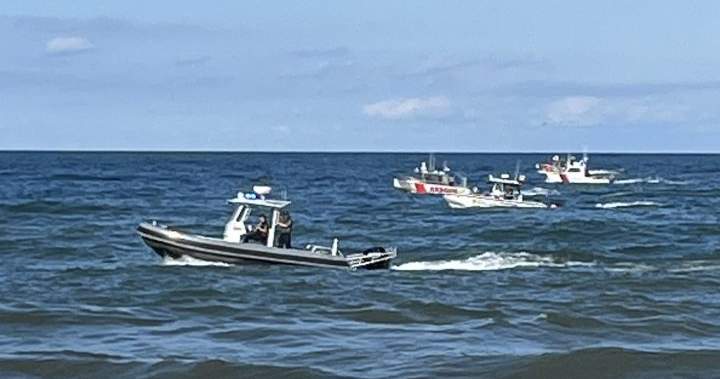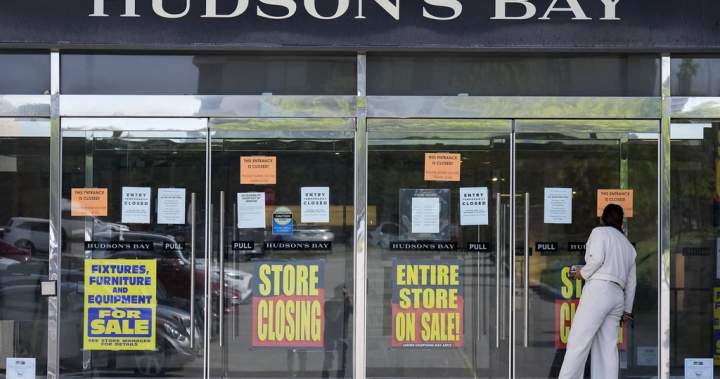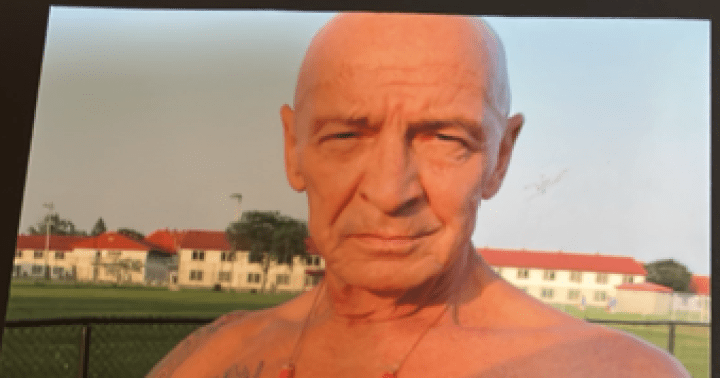Uncategorized
10 drownings in Ontario region sparks urgent plea for water safety

A troubling spike in water-related deaths has authorities and safety advocates urging boaters and swimmers across Ontario to take life-jacket use and water safety more seriously.
According to the Ontario Provincial Police (OPP), 10 people have died in marine incidents in eastern Ontario so far this summer — more than double the number recorded by this time last year.
In every case, the victim was not wearing a life jacket.
“This is about education and changing the mindset to ensure everyone wears the proper gear, whether in a power boat or in a canoe,” said Chief Superintendent Lisa Wilhelm, OPP East Region Commander.
“This is about coming home safely and ensuring that everyone, adults and children, are safe on or near the water.”
The warning comes amid a series of devastating incidents that have already taken place in Ontario waters.
At a provincial park in Lake Erie, a 35-year-old man from Woodstock drowned while trying to save his daughter.

Get breaking National news
For news impacting Canada and around the world, sign up for breaking news alerts delivered directly to you when they happen.
Police recovered his body the next day.
In another tragic incident, an 18-year-old swimmer was pulled from Ipperwash Beach, unresponsive and later pronounced dead in hospital.
Just days later, a 44-year-old man died after diving from a boat into shallow water, the second fatality there in the same week.
While police emphasize the importance of life-jackets, experts say the broader issue is a lack of public awareness and enforcement, particularly when it comes to commercial and recreational boating safety.
Greg Swanson, chief regulator officer of SABA, an education and awareness NGO, told Global News that the statistics are very unfortunate.
“The fact that people are still out on the water without life-jackets… is surprising. It would save a lot of lives if people used them,” he said.
Swanson says SABA’s campaign is focused on promoting safety equipment and sound boating practices including better oversight of commercial charter operations.
“Our big thrust is to stop the illegal charters who seem to express very little care for their passengers… if you fall off their boat, you are on your own,” Swanson emphasized.
He also warned that many vessels, particularly in the unregulated charter sector, are not meeting federal safety standards. “Your boat needs to have specific equipment as set out by Transport Canada,” he said.
“And if you are not a swimmer… you really ought to put that thing on.”
Beyond life-jackets, Swanson stressed that safety also depends on proper training, especially in how to assist others in distress without endangering yourself.
“The practice is you cannot save someone by endangering yourself. If the person you are trying to rescue is capable, then use devices like life rings,” he explained.
For a child or disabled person, there is a tendency to expose yourself to an increased level of danger, Swanson added. “But there are practices to retrieve someone without drowning yourself, and wearing a life-jacket is one of them.”
As the OPP continues to investigate this summer’s fatal incidents, the message from both police and advocates remains urgent and pressing.
“If you are on or near the water this summer, ensure that you and your children are protected. Wear your life jackets,” the statement read.
© 2025 Global News, a division of Corus Entertainment Inc.
Uncategorized
World juniors case raises consent questions, but appeal unlikely: experts

An appeal by Crown prosecutors of Thursday’s acquittal of five hockey players in the high-profile world juniors sexual assault case is unlikely, legal experts say, despite questions about whether consent was properly considered.
Michael McLeod, Carter Hart, Alex Formenton, Dillon Dubé and Cal Foote were found not guilty of all charges after a weeks-long court case that centred on an alleged group sexual encounter in London, Ont., in 2018, in which the players had been accused of non-consensual sex.
The Crown has 30 days to decide whether to appeal the decision to a higher court.
In her ruling, Ontario Superior Court Justice Maria Carroccia said she did not find the female complainant, known as E.M. in court documents due to standard a publication ban, “credible or reliable.” She also dismissed the Crown’s argument that E.M. had only consented out of fear.
“This case, on its facts, does not raise issues of the reformulation of the legal concept of consent,” she said in her decision.
While those statements and others made by Carroccia have been criticized, even legal experts who take issue with them say they may not be sufficient grounds for an appeal.
“I don’t agree with the way that the judge came to her decision, but the decision is really well-reasoned,” said Daphne Gilbert, a legal professor who teaches courses on sexual assault law at the University of Ottawa.
“Appeal standards aren’t just that you disagree with the result. You have to to show an error in law. And I don’t see an error in law in the decision itself.”

How the legal definition of consent factors in
Melanie Randall, a Western University law professor whose research includes women’s autonomy rights, said Canada’s “extremely progressive statutory definition of consent” in criminal law means “we’re not looking for the ‘no,’ we’re looking for the ‘yes.’”
In other words, she said, a judge or jury must take into account the female complainant’s own mindset behind her decision to consent to a sexual act, and determine if that consent is truly voluntary, which can be a subjective assessment.
The court heard during the trial that E.M., who testified she was drunk and not of clear mind, was in the washroom after she had consensual sex with McLeod on the night in question and came out to a group of men in the room allegedly invited by McLeod in a group chat.
It was then that the Crown alleged several sexual acts took place without E.M.’s consent.

Get breaking National news
For news impacting Canada and around the world, sign up for breaking news alerts delivered directly to you when they happen.
Defence lawyers suggested E.M. wasn’t as drunk as she said she was, wanted a “wild night” with the players, was “egging” them on to have sex with her and accused her of having a “clear agenda” during the court process, which was a judge-only trial.
E.M. pushed back against those claims and at points outright rejected them, saying she was coaxed into staying in the room and was disrespected and taken advantage of by the group, who she said “could see I was out of my mind.”
“E.M. was unwavering in telling the court that she did not consent, she did not want this, she did not provide her voluntary agreement,” Randall said.
“She explained in excruciating detail why it was complex for her to cope in that situation where she felt threatened and unsure of how to respond, and I think used a lot of strategies of appeasement and acquiescence.”

Although Randall agreed that the decision itself was legally sound, she believes Carroccia “went much further than she needed to” in the analysis of consent by ruling E.M.’s consent was voluntary.
“The judge basically said one of two things: either she knows better than E.M. does what her own subjective state was, or E.M. is a liar,” Randall said. “I think those are two very unfortunate and damaging consequences of this decision.”
Gilbert said a possible appeal could be launched on the allegation the judge was biased against E.M., but called that “kind of a nuclear option.”
“Usually you wouldn’t accuse a judge of bias from what they write in a judgment, because they’re actually making explicit the reasons upon which they made their decision,” she added.
“Bias arguments are more likely to come from attitudes in the courtroom or things that were said in the courtroom that then you felt contributed to a wrongful verdict.”
She suggested the judge could have done more to rein in the defence lawyers in their cross-examination of E.M., which the complainant’s lawyer Karen Bellehumeur said after the verdict Thursday was at times “insulting, unfair, mocking and disrespectful.”
“A fair trial is one where decisions are made based on the evidence and the law, not on stereotypes and assumptions, and where the trial process respects the security, equality and privacy rights of the victim, as well as the accused persons,” Crown attorney Meaghan Cunningham told reporters outside court Thursday.
Toronto lawyer Lorne Honickman told Global News the Crown will likely look “very, very closely” at the issue of consent in the judge’s ruling as it determines its next steps.
“If they believe that there may have been an error there in law, they will take this 30-day appeal period or review period to determine whether or not they want to appeal,” he said.
“Perhaps — and I underline ‘perhaps’ a hundred times — a higher court will be looking at the issues here and making further determinations.”

Scientific context missing in consent argument
In her ruling, Carroccia noted the Crown did not present any scientific evidence or testimony she could consider that would support its claims that E.M.’s had only consented under fear or duress — something scientific experts were also puzzled by.
“I think the complexity of how the complainant responded isn’t well understood,” Dr. Lori Haskell, a Toronto-based clinical psychologist who specializes in trauma and abuse and has served as an expert witness in previous trials, told Global News.
Haskell cited neuroscientific research that has shown how the brain can shut down parts of the prefrontal cortex that affect decision-making, logic and reasoning in stressful or threatening scenarios.
“They’re now in survival brain,” she said of people during situations of real or perceived threats.
“It’s easy when you’re not in that situation to assume you could (fight or run away), but I think we need to look at, what are similar situations? How do people respond?”
She continued: “I mean, how do men respond to hazing on sports teams? We know young men in universities have been quite traumatized with things done to them.”
Without that further context, experts like Gilbert and Randall said the judge’s ruling appeared to accept some of the most widely-held myths regarding sexual assault, including arguments made by the defence lawyers that E.M. had “created a lie” out of regret and embarrassment.
“Although the slogan, ‘Believe the victim,’ has become popularized as of late, it has no place in a criminal trial,” Carroccia wrote at one point in her decision.
“To approach a trial with the assumption that the complainant is telling the truth is the equivalent of imposing a presumption of guilt on the person accused of sexual assault and then placing the burden on him to prove his innocence.”

London, Ont., defence lawyer Phillip Millar told Global News he felt “relief” to see that sentiment expressed in the decision.
“I was worried our judicial system has (been) going too far in terms of buying into the ‘believe all victims’ (idea) before the person has been determined to be a victim by the justice system,” he said.
“What was done is the law of consent was properly applied. You can’t redefine consent because it’s inconvenient to you, or because you want to retroactively retract it. Just because you’re not proud of what you did on a day doesn’t give you the ability to redefine what is consent.”
Randall and Gilbert noted that acquittals mean the threshold of proving something beyond a reasonable doubt was not met by the Crown, but how Canadians and those in the public realm view the details laid out during the court process may be another question.
“I don’t think an appeal is the only strategy here,” Gilbert said. “I think there’s lots of things we can respond to this judgment with that are, you know, powerful things to respond with that aren’t necessarily appealing.”
Uncategorized
More Hudson’s Bay lease deals reached

Hudson’s Bay has reached deals to sell the leases of six store locations as legal wrangling continues on work to close a deal to sell up to 25 leases to B.C. billionaire Ruby Liu.
Legal filings show clothing retailer YM Inc. has struck a deal to buy five leases for $5.03 million, while it was unable to secure landlord approvals for three other locations.

Get daily National news
Get the day’s top news, political, economic, and current affairs headlines, delivered to your inbox once a day.
The five leases include Vaughan Mills in Vaughan, Ont., Tanger Outlet in Kanata, Ont., Outlet Collection in Winnipeg, CrossIron Mills in Rocky View, Alta., and Toronto Premium Outlets in Halton Hills, Ont.
Separately, Ivanhoe Realties Inc. has agreed to pay $20,000 for a lease at Metrotown in Burnaby, B.C., that its parent company Ivanhoe Cambridge owns.
Hudson’s Bay put its leases up for sale earlier this year, after it filed for creditor protection and closed its 80 stores and 16 under its sister Saks banners.
Three leases which sold for $6 million were already transferred to Liu who wants to buy 25 more to open a department store.
© 2025 The Canadian Press
Uncategorized
Police recapture convicted murderer who escaped Quebec prison

Correctional Service Canada says a convicted murderer who escaped from a Quebec prison nearly three weeks ago has been recaptured.
They say Lory Bill Germa was apprehended by the Montreal police at around 7:45 a.m. Friday.

Get daily National news
Get the day’s top news, political, economic, and current affairs headlines, delivered to your inbox once a day.
The 69-year-old escaped from the Archambault Institution north of Montreal on July 5.
Staff at the prison’s minimum-security unit reported him missing after noticing he was absent during an inmate count.
Germa had been serving a first-degree murder sentence for a crime committed in 1992.
Ontario Provincial Police issued a news release after the escape saying Germa might be in southwestern Ontario.
This report by The Canadian Press was first published July 25, 2025.
© 2025 The Canadian Press
-

 Uncategorized1 month ago
Uncategorized1 month agoThese ’90s fashion trends are making a comeback in 2017
-

 Uncategorized1 month ago
Uncategorized1 month agoAccording to Dior Couture, this taboo fashion accessory is back
-

 Uncategorized1 month ago
Uncategorized1 month agoThe old and New Edition cast comes together to perform
-

 Uncategorized1 month ago
Uncategorized1 month agoUber and Lyft are finally available in all of New York State
-

 Uncategorized1 month ago
Uncategorized1 month agoNew Season 8 Walking Dead trailer flashes forward in time
-

 Uncategorized1 month ago
Uncategorized1 month agoMeet Superman’s grandfather in new trailer for Krypton
-

 Uncategorized1 month ago
Uncategorized1 month ago6 Stunning new co-working spaces around the globe
-

 Uncategorized1 month ago
Uncategorized1 month agoThe final 6 ‘Game of Thrones’ episodes might feel like a full season








